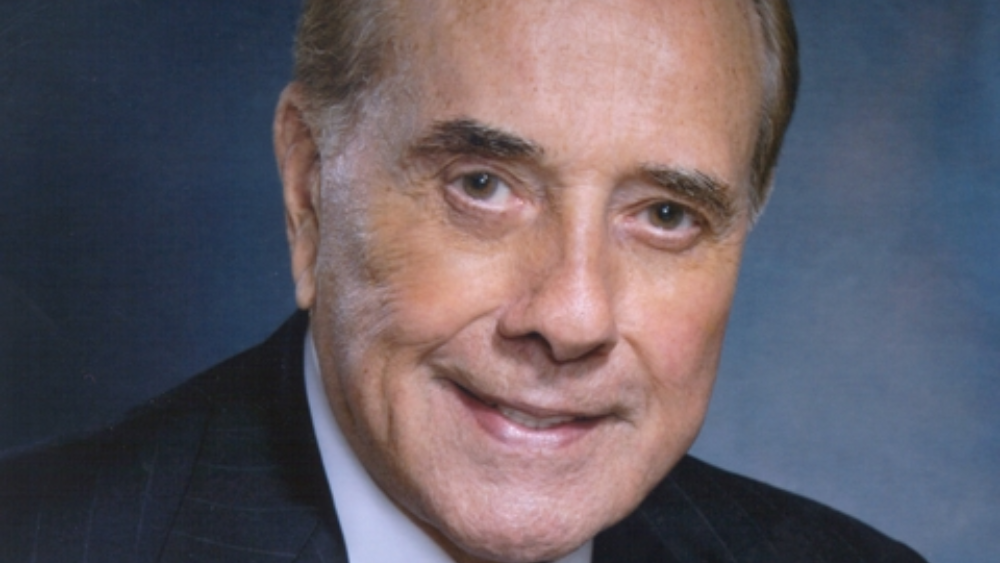Robert Joseph “Bob” Dole (July 22, 1923 – December 5, 2021) stands among the most enduring and respected figures in American political history. Soldier, senator, and statesman, Dole dedicated his life to serving the nation with courage, integrity, and a sharp wit that became one of his trademarks. His journey from a small town in Kansas to the highest ranks of government is not only a story of political success, but also of perseverance in the face of life-altering hardship.
Early Life in the Heartland
Bob Dole was born in Russell, Kansas — a modest town shaped by the hardships of the Great Depression. Growing up in a working-class family taught him the importance of resilience, hard work, and the value of community. His parents, Doran and Bina Dole, instilled in him strong Midwestern values and a deep sense of responsibility toward others.
At Russell High School, Dole was an athlete and student leader. He dreamed of becoming a doctor and enrolling at the University of Kansas in 1941. But like many young men of his generation, Dole’s plans were interrupted by World War II.
The Soldier Who Would Not Give Up
In 1942, Dole joined the U.S. Army’s 10th Mountain Division. His leadership and determination quickly stood out, and by 1945, he was serving as a Second Lieutenant in Italy. During combat near Castel d’Aiano, Dole was struck by German machine-gun fire, suffering devastating injuries to his shoulder, spine, and arm. His comrades assumed he wouldn’t survive.
Against all odds, he did. After being rescued and sent home, Dole began a grueling recovery that lasted years. He endured multiple surgeries and never regained full use of his right arm. Yet, rather than let the injury define him, Dole turned it into a source of strength. The people of Russell raised money to help pay for his rehabilitation — a gesture he would never forget and that deepened his sense of public duty.
“I figured if I didn’t get back up, I’d be letting everyone down,” he later said. “I had to try.”
From Local Service to the U.S. Senate
Dole’s determination led him into politics. After earning a law degree from Washburn University, he began his career as a county attorney in Kansas in 1952. His integrity and strong voice for local issues earned him the trust of his community, paving the way for a national office.
In 1960, he was elected to the U.S. House of Representatives, where he served four terms. In 1968, he successfully ran for the U.S. Senate — a position he would hold for nearly 30 years.
Throughout his Senate career, Dole became known for his mastery of legislative detail and his ability to find common ground across party lines. His humor — often dry and self-deprecating — helped him navigate the rough edges of Washington politics. Colleagues from both parties respected him as a man who stood by his principles while understanding the art of compromise.
Leadership and Legacy in the Senate
Bob Dole’s leadership in the Senate was marked by a steady hand and a pragmatic approach to governance. He served as both Majority Leader and Minority Leader, helping guide legislation through some of the most complex political eras of the late 20th century.
He played major roles in shaping key laws related to agriculture, Veterans’ Affairs, and the economy. Dole was instrumental in passing the Food Stamp Reform Act, the Americans with Disabilities Act, and numerous bills supporting military Veterans — a cause close to his heart.
Despite being a loyal Republican, Dole was never afraid to reach across the aisle. He worked with Democrats to stabilize Social Security, supported civil rights legislation, and helped negotiate bipartisan solutions during times of division. His leadership reflected an era when political opponents could still work together for the common good.
A Presidential Dream
Dole’s ambition and experience naturally led him toward the presidency. He sought the Republican nomination several times — in 1980, 1988, and finally in 1996, when he became the Republican candidate for president.
His 1996 campaign against incumbent President Bill Clinton was marked by civility and decency — qualities that defined his career. Although Dole lost the election, his concession speech was gracious and dignified, reinforcing his reputation as a man of honor.
Dole’s humor shone even in defeat. When he appeared on The Late Show with David Letterman shortly after the election, he opened with, “You know, I slept like a baby last night — every two hours, I woke up and cried.” The audience loved him for it.
Life Beyond Politics
After leaving the Senate in 1996, Dole continued to serve the public in many ways. He became a champion for Veterans, disability rights, and public service initiatives. Alongside his wife, Elizabeth Dole, who also had a distinguished political career, he founded organizations dedicated to helping wounded soldiers and their families.
In 1997, Dole was awarded the Presidential Medal of Freedom, one of the nation’s highest honors. He also received the Congressional Gold Medal in 2018, recognizing his lifelong commitment to the country.
Even in his later years, Dole remained a presence in American life — a symbol of integrity, perseverance, and optimism. When he stood to salute President George H.W. Bush’s casket in 2018 — rising from his wheelchair with effort and respect — the moment captured the essence of his life: courage, dignity, and devotion to duty.

The Man Behind the Statesman
Beyond politics, Bob Dole was known for his humor, humility, and deep love for his country. Despite his injuries, he rarely complained and often joked about them to put others at ease. He believed that humor was not just a coping mechanism but a bridge between people.
He was also a devoted husband. His marriage to Elizabeth Dole — a U.S. Senator, Cabinet Secretary, and public servant in her own right — was one of mutual admiration and shared purpose. Together, they became one of Washington’s most respected power couples, balancing their professional and personal lives with grace.
A Lasting Legacy
Bob Dole’s passing in 2021 marked the end of an era. He was 98 years old — a living link to a generation defined by sacrifice, duty, and faith in America’s potential. Tributes poured in from across the political spectrum, reflecting the universal respect he earned over decades of service.
His life story remains a testament to the power of perseverance. From a small-town Kansas boy to a national leader, Bob Dole embodied the American ideal that adversity can forge greatness.
Bob Dole never stopped starting over. Whether on the battlefield, in recovery, or in the halls of Congress, he met every challenge with the same unwavering strength. His legacy lives on — not just in the laws he helped pass or the offices he held, but in the example he set for generations to come.











